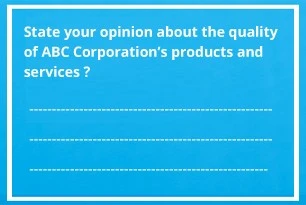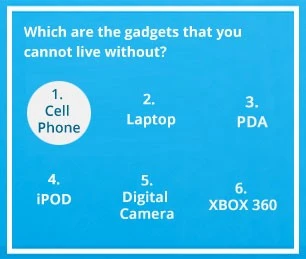Types of Questionnaire Formats
There are two types of questionnaire questions, open-ended and closed-ended. Following description will help you understand the format of questionnaire better, have a look:
 Open Format Questions
Open Format Questions
Open format questions or open-ended questions give your audience an opportunity to express their opinions in a free-flowing manner. These questions don't have predetermined set of responses and the respondent is free to answer whatever he/she feels right. By including open format questions in your questionnaire, you can get true, insightful and even unexpected suggestions. Qualitative questions fall under this category.
An ideal questionnaire would include an open-ended question at the end of the questionnaire that seeks feedback and/or suggestions for improvements from respondents.
 Closed Format Questions
Closed Format Questions
Multiple choice questions, where respondents are restricted to choose among any of the given multiple choice answers are known as closed format or closed-ended questions. There is no fixed limit as to how many multiple choices should be given; the number can be even or odd.
One of the main advantages of including closed format questions in your questionnaire design is the ease at performing preliminary analysis. These questions are ideal for calculating statistical data and percentages, as the answers set is known. Closed ended questions can also be asked to different groups at different intervals to efficiently track their opinion about a product/service/company over time. Closed-ended questions can be further classified into 7 types.
 Example of a Closed Format Question
Example of a Closed Format Question

Classification of Closed Format Questions for Questionnaire Design
There are 7 ways in which pollsters can create polling or survey questions for their respondents to collect accurate statistical data. Following is a list of 7 types of closed-ended questions that can be a part of your questionnaire design:
A. Leading Questions
Questions that force your audience for a particular type of answer are known as leading questions. In a leading question, all the answers would be equally likely. An example of a leading question would be a question with choices such as, fair, good, great, poor, superb, excellent etc. These questions are meant to get an opinion from the audience in limited words.
Example of a Closed-Ended Leading Question
B. Importance Questions
In importance questions, the respondents are usually asked to rate the importance of a particular issue, on a rating scale of 1 to 5. These questions can help you understand things that hold significance to your respondents and allow you make business critical decisions.
Example of a Closed-Ended Importance Question
C. Likert Questions
Likert questions can help you ascertain how strongly your respondents agree to a particular statement. Such type of questions also help you assess how your customers feel towards a certain issue, product or service.
Example of a Closed-Ended Likert Question
D. Dichotomous Questions
These are simple questions that ask respondents to answer in a yes or no. One major drawback with dichotomous questions is that it cannot analyze the answers between yes and no, there is no scope for a middle perspective.
Example of a Closed-Ended Dichotomous Question
E. Bipolar Questions
Bipolar questions are the ones having two extreme answers written at the opposite ends of the scale. The respondents are asked to mark their responses between those two.
Example of a Closed-Ended Bipolar Question
F. Rating Scale Questions
In rating scale questions, the respondents are asked to rate a particular issue on a scale that ranges between poor to good. Rating scale questions usually have an even number of choices, so that respondents are not given the choice of selecting a middle option.
Example of a Closed-Ended Rating Scale Question
G. Buying Propensity Questions
Buying propensity questions try to assess the future intentions of customers and determine respondent's buying intention. These questions ask respondents if they want to buy a particular product, what requirements they want to be addressed, and whether they would buy such a product in future.
Example of a Closed-Ended Buying propensity Question
Questions to Be Avoided In a Questionnaire
There is something more important than knowing the questionnaire format and what type of questions to be asked in a questionnaire. It is understanding, what questions need to be avoided in a survey or poll.
Take care to avoid following type of questions when preparing a questionnaire:
Embarrassing Questions
Questions that ask respondents details about their personal and private matters are embarrassing questions. Such types of questions are better to be avoided as you risk losing trust of your respondents.
Positive/ Negative
Connotation Questions
Since most verbs, adjectives and nouns in the English language have either a positive or negative connotations, questions are bound to be taken as either positive or negative. While defining a question, strong negative or positive overtones must be avoided.
Hypothetical Questions
Hypothetical questions are based on speculation and fantasy. These questions force respondents to give their ideas on a particular subject, and generally the data collected through such questions are inconsistent and unclear. Hypothetical questions should be avoided in questionnaires.

We have over a decade of experience in offering comprehensive marketing questionnaire design services, as a part of which we help you decide which questions should be added to a questionnaire, frame those correctly, and use them effectively to improve your business productivity.
Read More »OUR CASE STUDIES
-
Online Healthcare Study for Market Research Firm
We worked with a leading Swedish market research firm to generate a high-quality and extensive online healthcare report consisting of data from 17 different countries.
-
Financial Research and Analysis for an Equity Firm
We helped a leading equity firm execute a research project on the pension funds of different states in the U.S. within a record time of four months.
-
Online Research Services Provided
We performed dealer mapping for a leading manufacturer of high-end precision instruments in Europe, as part of the online research services that we provide in the domain of market research.
CUSTOMER SAYS
The services that Outsource2india provided helped us achieve substantial cost and time savings on several difficult research projects. Their prompt attention to our requests and attention to detail are excellent.![]()
Automotive & Transportation Industry Solutions Group
Get a FREE QUOTE!
Decide in 24 hours whether outsourcing will work for you.
Have specific requirements? Email us at: ![]()





